Saleswhale Blog | 21 Min Read
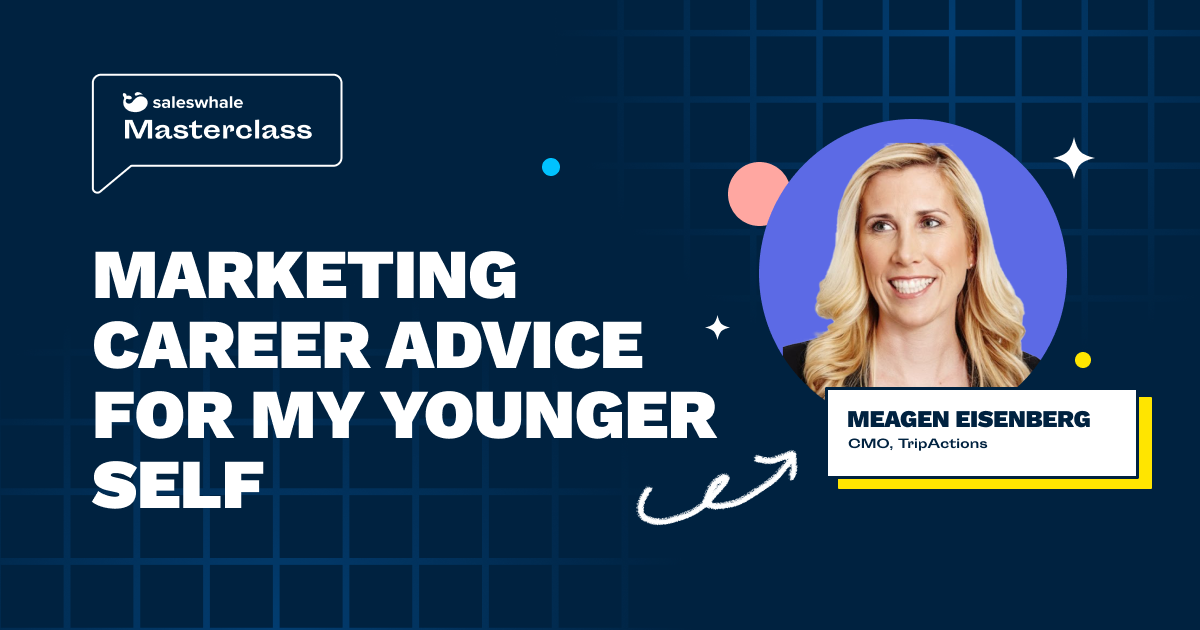
How can B2B marketers gain an edge as a marketer and help their companies (and careers) grow?
In this Saleswhale Masterclass session, we cover the following topics with Meagen Eisenberg:
Bio
Meagen Eisenberg is CMO at TripActions, the leading global business travel platform. She brings more than 20 years of experience in marketing in tech and is long regarded as one the most influential leaders in the space. Besides her everyday role, Meagen has served (and continues to serve) as an advisor to the world's most successful tech start-ups. Since 2011, she has operated and advised 12 successful exits, including 2 IPOs and 10 mergers and acquisitions.
Speakers
Meagen Eisenberg, CMO @ TripActions
Brandon Gargan, Director of Sales @ Saleswhale
Brandon Gargan:
Hi, everybody. Welcome to Saleswhale Masterclass. My name is Brandon Gargan and I am the director of sales here at Saleswhale. Joining me today is Meagen Eisenberg, chief marketing officer at TripActions. Meagen has been recognized as one of the most influential marketing leaders and influencers and has spent more than 20 years marketing in tech. When it comes to marketing and leadership, there's pretty much nothing that Meagen has done. She's done it all. So this is going to be fun. Thanks for joining me, Meagen.
Meagen Eisenberg:
Thank you for having me. Happy Friday.
Brandon Gargan:
Happy Friday. So Meagen, I'm going to be honest with you. Today, we're giving advice to those people who are earlier on in their careers or starting in a new role, but it was a little intimidating for me to prep for this because you've accomplished so much and your career has spanned so many different verticals. You just have so much experience. So it was hard for me to frame everything in one brief conversation.
Brandon Gargan:
So I'm hoping if it's okay with you, we can sort of hop in a time machine and just kind of visit different stops along your journey and draw from that experience, if that's cool.
Meagen Eisenberg:
Sure. Happy to do that.
Brandon Gargan:
Awesome. So first off, why marketing? What drew you in?
Meagen Eisenberg:
It's interesting. I didn't start out in marketing. I was an IT engineer out of college. I had graduated MIS so management information systems with a minor in computer science. And I took my first job at Cisco systems and was working for master schedulers, coding for them, for their reporting and tools that they needed to keep manufacturing and hitting what we needed to do.
Meagen Eisenberg:
I started to shift into other roles in that team. A lot of acquisitions that Cisco did, I don't know, 80 to 100 acquisitions a year back then, and it was right before the downturn and then they started doing divestitures. But in that process, I realized if I wanted to continue to move up in my career, I needed to get an MBA.
Meagen Eisenberg:
Most of the leaders in manufacturing and IT had MBAs. And so I decided to apply and went and got my MBA at Yale. Through that process and I was on an educational leave of absence from Cisco, I started doing finance and strategy and then part of your curriculum is marketing and I realized how much I loved it.
Meagen Eisenberg:
So I doubled down on marketing courses and I still stuck with strategy because Yale was known for strategy and finance. So I doubled down in marketing, took strategy and thought I could come out and market for tech because I understood the buyer. I understood the IT engineer and software side of it, and I could understand what they were trying to sell.
Meagen Eisenberg:
So I actually made the pivot during business school. I took an internship. Cisco Systems, let me as an employee take a summer internship at IBM, and I did. I stayed on the East Coast and worked out in New York and loved it and decided to leave Cisco when I graduated and I joined IBM and they had a marketing leadership development program that they hired graduates from Yale and you would do project based work and you had a team. And so that kind of put me into marketing.
Brandon Gargan:
That's awesome. That's actually a good segue into sort of your IBM days of product marketing. Coming in straight out of that or into that program, what did you learn in that first year that you didn't maybe learn in school or you didn't expect to?
Meagen Eisenberg:
Yeah. So I went and worked for the COO of a company called Trigo. IBM had just acquired Trigo, about an 80-person company, which has an amazing size to join. And Dan Druker, their CMO, I had a very strong product marketing background, hired me in to be a product marketer and taught me a lot about what I needed to do to be good at my job. A big part of it was supporting and partnering with sales. He definitely had a philosophy that they were your internal customer. You were there to support them and make them successful, which I think is a key thing for me through the rest of my career is strongly partnering with sales leaders and your sales teams.
Meagen Eisenberg:
In a company, you're driving revenue and at the front of that is your sales team, and if you can enable them, make them productive and understand what their challenges are and fix them, then they're going to be more productive and you'll hit your revenue targets. So that was a really key learning under Dan was supporting the team and then really understanding the product and customer, and what they needed, how they used it.
Meagen Eisenberg:
We traveled a ton in that group, so went all over the world demoing the product and showcasing the product at different. I did some work on our RFID product. So I got to go to all these IBM RFID labs around the world and set up the demo and got to go down to South America, South Palo. Got to go to Auckland and all over Europe. So it was an amazing first couple of years taking that product to market.
Brandon Gargan:
That's awesome. It sounds like a really cool experience. After that, you moved from Tririga, if I'm pronouncing that correctly to ArcSight where you headed up marketing programs and operations. That's kind of a different culture perspective, I think from IBM going into more of that startup world, what led you out of product marketing and what was that transition like?
Meagen Eisenberg:
Yeah. So I think that's the trick of it. The team that I met at that 80-person company that had been acquired, formed the next set of companies for me. So Tom Riley was the CEO at Trigo and Byron Deeter was the founder and ran biz dev, and Dan was the CMO. Dan left to go to Postini, which I followed Dan over to Postini and was still in product marketing. Then they were acquired by Google and I left,.
Meagen Eisenberg:
To take you to ArcSight, the CEO of ArcSight was Tom Riley. So he eventually left IBM and took the helm of ArcSight and then took them public. I joined right after they went public and was there for three and a half years. You stay within the network you make. If you do really good work, those leaders will pull you into your future companies because they know the quality of your work and what you can do for the business.
Meagen Eisenberg:
So I went to ArcSight because Tom was the CEO and then we got acquired by HP. So two and a half years in, we got acquired by HP and I stayed for a year and a day. And then interestingly enough, my next transition was to DocuSign. And Byron Deeter made the connection for me to Keith Krach who had just become the CEO of DocuSign.
Meagen Eisenberg:
One of the things about my early career is really delivered to do well because the people that are leaders will pull you into other opportunities. And Byron of course is at a VC and has introduced me to many CEOs and leaders over the last 15 years.
Brandon Gargan:
Yeah. That's awesome. I mean, I know I've experienced that myself throughout my career. It's if you kick ass you get remembered, right? And people want you on their team wherever they go. So that's another good segue into DocuSign, right? You were one of their early marketing hires. You were the VP of demand gen at a time when they were going through like insane growth. I'm sure that time was a blur for you, but I'm also sure you learned a lot. What would you say you learned the most from that shift into demand gen. That's a different beast from your previous two stops.
Meagen Eisenberg:
Yeah, it was. I had been in middleware infrastructure at IBM. And really ArcSight was deep security technology. Nobody had heard of it. This was the first time I... I mean, I'd been in SaaS with Postini, but it was deep SaaS. It was a SaaS technology company and it was a brand name that a lot of people knew. You bought your house with DocuSign, you bought a Harley Davidson, eventually a Tesla. It was more of a B2B to C because there was a consumer element. We had a lot of people who knew about us because of their consumer experience.
Meagen Eisenberg:
So that was one thing just understanding how SAS worked. We were very strong in SMB mid-market and we were moving up enterprise. So really understanding the SDR world inside sales, field calls, how you're supporting them and then the breadth at which we supported a go to market. You're going to SMB, mid market is so different than enterprise.
Meagen Eisenberg:
So starting to understand what are the different marketing tactics, campaigns needs are by the different sales. So you have an enterprise sales, you have a mid market and then you have phone field, and then you have direct to real estate agents, let's say that were a huge early adopter of DocuSign.
Meagen Eisenberg:
So just learning that, and then there's three things that you need to scale a company. It's the right people, the right technology and the right process. And so going from 150 person company at DocuSign to a 1,300 person company, you bring on a lot of people, you bring in a lot of technology, you bring a lot of process.
Meagen Eisenberg:
So marketing brought in 30 different technologies alone, and building a robust website and funnel for your sales team, the handoff, understanding what's working, what's not. Our budget jumped significantly. So all of those things you started to form and you built a team. Every time you go to a company, you meet people and then you work with them at future companies. So over a dozen people, I worked with at the next company and then the next company. And so you just make a good group of a team, folks in your network.
Brandon Gargan:
For sure. In my previous masterclass, we talked about the difference between experience and practice. I was part of a ride of a high hypergrowth startup as well, and it sounds like you got a lot of practice in that role that you carried with you moving forward, including a really strong network. So after your time at DocuSign, you became the CMO at Mongo DB. They're massive now obviously doing really well, but many marketers aspire to one day become a CMO, but that's not easy and it's maybe not realistic for a lot of people. What was that process like for someone who's never been through it? And what was going through your head on your first day?
Meagen Eisenberg:
Yeah. I mean, I think in marketing in particular, part of being able to lead is having an expertise. Marketing has many areas to it, which I think is why it's so exciting. If you do product marketing, that's very different than event marketing, which is different than demand gen or growth marketing, which is different than the design and the website and communications and PR. So up to that point, I had experienced in product marketing. I was gaining and getting deeper experience in demand gen and becoming an expert in demand gen. I was working with the other functions. I was working with PR and comms. Actually, Greg Perotto ran PR and comms at DocuSign, and now runs PR and comms for me here at TripActions.
Meagen Eisenberg:
But I wasn't an expert in it in any way. So I didn't have a command of all of that. So part of when you don't have a command of all the functions in your particular function and role is that you've got to be able to hire really well, and you have to be a continual learner and keep trying new things and surround yourself with people that are experts. So as I was making the transition, I was scared, certainly.
Meagen Eisenberg:
I didn't know if I was capable of doing it. I was going to be switching from DocuSign to a deeply technical developer focused product, a database MongoDB across... We were dual headquarters, but almost everything was in New York and I was living in California in Palo Alto. I had just had my third daughter. She was four months old when I took role.
Meagen Eisenberg:
I do remember just being a little terrorized joining as a CMO, but the CEO that hired me had a lot of confidence in me. I had tried to be the COO at DocuSign and wasn't successful. So in that attempt, I was building my confidence and what I needed to do it. I had someone that was very confident in me. It took about a month or two where I felt like, okay, you know what, I think I've got this. I can hire, I have a good network. I can tap into it when I don't know how to do something. I've got really strong leadership support from the CEO.
Meagen Eisenberg:
People are willing to take a bet and come join my team and helped me build it out. And so we grew from, I think I had 24 people in marketing and we grew to 70 something over the next four years, but building out the leaders you got to bring in strong leaders who then bring in strong talent. It was quite a transition, but I also had very good support from my husband. He was like, "You can do it. We got this. We got three kids." He works at Stanford full time, but he was on board to split the responsibilities and hold up the fort when I would travel. And he's been a great partner. Forever, he's been a good partner and still is a good partner.
Brandon Gargan:
That's awesome. It sounds like the support network is really important making that transition for the first time.
Meagen Eisenberg:
Yes, for sure. You've got to be a good scheduler. When you're trying to run a family and work, you have to be very organized and hyperschedule all the way out. Like handoffs, doctor's appointments, who's doing what, a family calendar matters and ownership matters. In some ways it's like work. You got to have owners and handoff and accountability and bubble gum and spit to hold it altogether.
Brandon Gargan:
For sure. Let me ask you this. And this is something that is really interesting for me to. A liquidity event or an IPO is sort of that penultimate goal of a lot of startups and you were the CMO at MongoDB when they IPOed. What was that experience like for you?
Meagen Eisenberg:
I mean, it was exciting and wild. I'd never done it. The real trick I think is your CEO and CFO are really the champions of that, and then you're there to make a big splash and get the word out and keep that momentum going and everything. So I was fortunate that my CEO at the time, he'd gone through IPOs. He'd gone through a lot and our CFO had an investment banker background, so he was solid with the markets and learnings.
Meagen Eisenberg:
Then our CRO Carlos, who's the CRO here at TripActions was just a strong partner. But I will tell you at the time, we kept thinking of recession was going to hit. We didn't know how the road show would go. Business as usual, but you're kind of quiet period, and then you have one day where you can make a lot of noise and then you got to go quiet again.
Meagen Eisenberg:
So there was a lot of excitement. Our office was a block and a half away from NASDAQ, so we had the excitement. Majority of the company was really in the area, so that was exciting. It was a beautiful day. So the activation, we got to take over Times Square and it was fun to see our logo and everything light up Time Square and ring the bell. We didn't have the recession. It took a little bit longer. Obviously we're in it now, but it was just a wild ride. Exciting, scary, all of those emotions.
Meagen Eisenberg:
I was fortunate enough. I had a good comms team master, Mark Wheeler. He lined up so many interviews in that day. He had like a four or five execs lined up 15-minute increments. We had over 24 interviews in one day and stories post. So it just the most amazing, I think, ability to get comms to market and to get up to make a really big splash in that day. It was very impressive. I think NASDAQ was impressed by our ability to get on the news cycles, and we just had very good, strong execs that could speak well to the different pubs because you've got the mainstream pubs, you've got the financial pubs, which are also mostly mainstream. You've got tech pubs that you're hitting. So just across the board, it was a busy day, but a lot of fun.
Brandon Gargan:
And I bet that was just really gratifying, right? All of the hard work that you guys put into it to have a successful IPO. That's what it's all about, right?
Meagen Eisenberg:
Yeah. It was wild to be on the floor and to watch the stock and the tickers go, and what happens behind the scenes. Yeah, it was just a huge learning for me.
Brandon Gargan:
That's cool. So jumping forward a little bit. This brings us up to two years ago. You became the CMO at TripActions, which is your current role. This was not your first time leading a marketing organization. You came in with a ton of experience having done this before. What was your plan of attack coming in and what did you set out to accomplish in the first 90 days?
Meagen Eisenberg:
Yeah. I think the biggest part of starting in a new company is you do a lot of listening and you're... Interviewing is a weird word, but you're sitting down with a lot of people at the company trying to understand what are the biggest problems you need to go solve to help get successful, the company become successful. Back to the three things. You know you need to bring in the right people, the right technology and the right process. So that's going on in your mind. But you need to get the feedback. What's happening in sales? What do they think marketing needs to do to support them? What's happening in product? What are they not getting from marketing? What's happening with HR? What do we need to do around brand? What does our website look like?
Meagen Eisenberg:
You're trying to get a sense of all the data you have access to, and if you don't have access to it, then you need to go get access to it. So that first 90 days, I was looking at people. I had 10 people on the team and we grew almost to 60, about 55. I added 20 people really quickly. In six weeks, we added 20 people. It was very apparent that we needed all the functions. I needed product marketing. I needed corporate marketing. I needed web and systems and I needed growth and demand gen. I needed an EMA team.
Meagen Eisenberg:
We didn't have anyone in Europe yet. We didn't have anyone in Asia. So we needed to go and just do... I just did a ton of hiring, which actually felt a lot easier than it was when I was hiring for folks to go to New York, because here I live in the Bay Area, I had a huge network here. So I think that accelerated some of the hiring. The Hot company business travel is fun. It's not infrastructure.
Meagen Eisenberg:
People know, they've used the product. We have very good customer sat and reviews. So a lot of people that had used it... A lot of tech companies use us. A lot of retail companies use us. So that I think made it easier to hire. And we'd gotten really good funding with our board. Ben Horowitz had just joined the board as well, so we were just getting a lot of good coverage, but I went about hiring. We put in 30 different technologies. We rewrote the entire website, all new code, all new messaging, new personas, graphics. There was just a lot that happened in the first 90 days.
Brandon Gargan:
I can only imagine. And I'm sure there were a lot of challenges too. What would you say was one of the biggest challenges you faced?
Meagen Eisenberg:
I think the biggest challenge is the level at which we were scaling. So I joined, we were a little over four years old. We had four or 500 people. We grew to 1,100 last year. We had not put all the systems in place that you would think at that size because if you think about it, most companies I have joined, they were about eight years old. MongoDB, eight years old. DocuSign, eight years old. They had 150 people and 400 people. But they had more systems. They had some other things in place. But when you get product market fit so early, which is what TripActions had and scale happened so fast, you haven't had time to put the process in place. You haven't had time to put the systems in place.
Meagen Eisenberg:
I didn't have even a spreadsheet of the budget or like tools to manage the budget. It was like you have this money. I was like, "Okay. Well, how's it set up?" "Oh, well, no. I just have a couple million. They have a couple million and everyone's just spending." I was like, "Okay, but what are you spending?" And so it was like oh, we need to organize the budget. We need to organize the function. We do this by month, by quarter, those sorts of processes in place to help you get a sense of your business.
Meagen Eisenberg:
We had Salesforce, we had Marketo, but we didn't have things like full circle CRM or attribution. So I didn't know when people were spending, if it was working or not working. So we needed to put the process in place, the handoff between marketing and sales to better monitor and measure that. We had an amazing brand. So I did have to spend a lot of time on brand like well loved brand, but I needed to spend time on hiring people, putting process and technology in place and dealing with the scale and being okay that there was 50 problems and I can only focus on these 10 and I will get to the others.
Meagen Eisenberg:
We had a backlog of things we had to do. So it did feel like days where everything was on fire like, "Yep, you're right. I need to fix that. Yep, you're right. Nobody's on social right now. Oh, you're right. We have this over here." We just took some money. We got to get a big PR launch announcement out there. We have all these happy customers, but nobody's capturing the stories. Sales needs a deck to use, but we haven't created the deck for them.
Meagen Eisenberg:
We have competitors but we haven't written competitive tear down sheets and stuff like that. We haven't set up objection handling. The list was unlimited. So that's why I knew I really had to start by hiring and assigning owners so we could check this stuff off.
Brandon Gargan:
Have a strong team, yeah. And having gone through that level of scale before, even if you're going from a couple hundred to 1100 or whatever that situation was, it happened so quick that you're still operating as a couple hundred person company and you have to catch up. So I can definitely relate to that. Speaking of challenges and reflecting a bit on sort of everything that we've discussed, you've experienced it all and you've been really successful in pretty much every role that you've been in. But I'm curious, are there any failures that sit with you? Because I know that I learned the most from my failures.
Meagen Eisenberg:
Yeah. I mean, I mentioned a little bit earlier, I tried to be the CMO of DocuSign. I had my third kid and I came back in two weeks after when the role opened up, Dustin moved on to ClearSlide. I tried to get the job for 12 weeks and I worked hard. I mean, you always work hard, but it was like, I really went for it and I didn't get it. But what I learned is one, it gave me confidence that I could do it. It kind of gave me that nudge that I needed. So you definitely learn from the things you don't get.
Meagen Eisenberg:
There's many things in life I haven't gotten, but I have incredible drive and ability to execute and resiliency when basing rejection or whatever. So I always just use it. I keep trying. And so I think that's part of the learning process too, when you just keep going and people shut a door and I find a window. Just early in my career, I would always get the projects. My managers were comfortable giving me projects that no one was able to complete and they just knew I would find a way because I'm stubborn. I may be ignorant on what I'm doing, and so I just have... This is what we need to do. Here's a way to get there and just keep trying.
Meagen Eisenberg:
You want that on your team. You want to be able to give people tough problems and they can go solve it. I mean, I love the people on my team. I can give them anything and they've got a good attitude. They may not know how to do it, but they go and figure it out. They don't come back to me and go, "Oh, I couldn't figure it out, or, oh, I need more money, or I need more people." They just have that way of solving it.
Meagen Eisenberg:
And even if it's a big lift or getting a lot of people who may be against the idea on board, they find a way to build the relationships to move the project forward, and I love that. I've always want more of that people on my team who can go solve problems.
Brandon Gargan:
Right. Resiliency is such a good word. I learned that early on in my sales career. You've got to find a way to overcome objection and just keep chugging along and find a way to make it work, so I love that. So that leads us to the last question for you. Obviously, this is the big one, right? What have you done right? If you could give advice to your younger self when you were back at IBM, just starting off in marketing, what would it be?
Meagen Eisenberg:
I think it's continual learning. So if I went back and even looked at all my Amazon books that I've ordered, because I was trying to find some. And I realize I have read a lot throughout my career. Pre-kids, I read a ton about being a leader, a manager, tribe, creativity. Having kids, all the things about being a good mom, working while having kids. When I wanted to be a CMO, I felt like I'd never done comm. So I read all these, I think David Aaker books, all these brand books. I kept buying brand books to learn more about how you do brand. I had gotten feedback in my career. I needed to be more creative.
Meagen Eisenberg:
So I got a bunch of books around creativity. Whenever I got feedback on something or I didn't know something, I read a lot. Now, with three children, I feel like it's gotten harder.
Meagen Eisenberg:
I read shorter snippets of things and articles more than long books, but I think continual knowledge reading, even in school, I wanted to be really good at Excel. So I bought a big Excel manual and read all about Excel and started doing their online courses. Lotus Notes, when I was at Applied Materials. I read a bunch of manuals on Lotus Notes. I just was always the type of person to pick up a new skill.
Meagen Eisenberg:
Salesforce, I think one of the best things I did when I switched into programs and demand, they had online classes of how to build reports, dashboards, how to understand the databases in there. I've taken that skill with me all the way through. I think it was the comfort level with technology, but I just knew in order to prove my point, I had to have the data. In order to get the data, I had to understand the tool.
Meagen Eisenberg:
So then I self-taught myself how to use and run dashboards and reporting. I've gotten a little bit further away from that and people help me create that more now, but I've always have understood what you can get out of Salesforce, which makes you ask better questions, understand how it fits together, understand the data you're getting. So I think that's just a big part of it is trying to learn, try to be an expert and to go deep on different topics.
Meagen Eisenberg:
In marketing, you want to get a sampling of everything, but it's when you become very deep on a topic that you can lead that topic. Then if you're good in getting things done, you take on more and more responsibilities. So I started out in demand gen, but then I get the website and then I get field marketing, and then I get the creative team and your team gets bigger and bigger because you're getting management skills and you're understanding the role that they're doing and leading.
Meagen Eisenberg:
You want to promote people who can take on more and more work and understand it and are respected as a leader by the other groups and can take on the work. It's harder to promote someone if they're too busy to take on it. They're always saying, "I'm so busy. I'm so busy. I can't give them more work."
Meagen Eisenberg:
So you've got to figure out as you move up in your crew, you get more efficient, you make decisions faster and you can take on more work. That's the idea. And so I think you start to have pattern recognition as you get more experienced and you can make faster decisions and take on more work and be more productive, and that's what you're trying to do so you can get more things done for the business and make better decisions for the business.
Brandon Gargan:
For sure. And having that drive to educate yourself and become an expert in each of these things that you're doing day to day helps make that decision-making process easier. So you can take on more work. So I think that's really good advice.
Meagen Eisenberg:
Yeah. You can recognize when you're hiring people if they know what they're doing, right?
Brandon Gargan:
Yeah.
Meagen Eisenberg:
If you've done the job or have a sense of what's needed, you can ask the right questions to make sure they've done the job.
Brandon Gargan:
Yep. I couldn't agree more. Well, Meagen, this has been awesome. I want to thank you again for taking the time to chat with me. For everybody else who attended today, thanks for watching and please keep an eye out for future masterclasses. But Meagen, again, I appreciate your time. Thank you so much.
Meagen Eisenberg:
Thank you for having me.

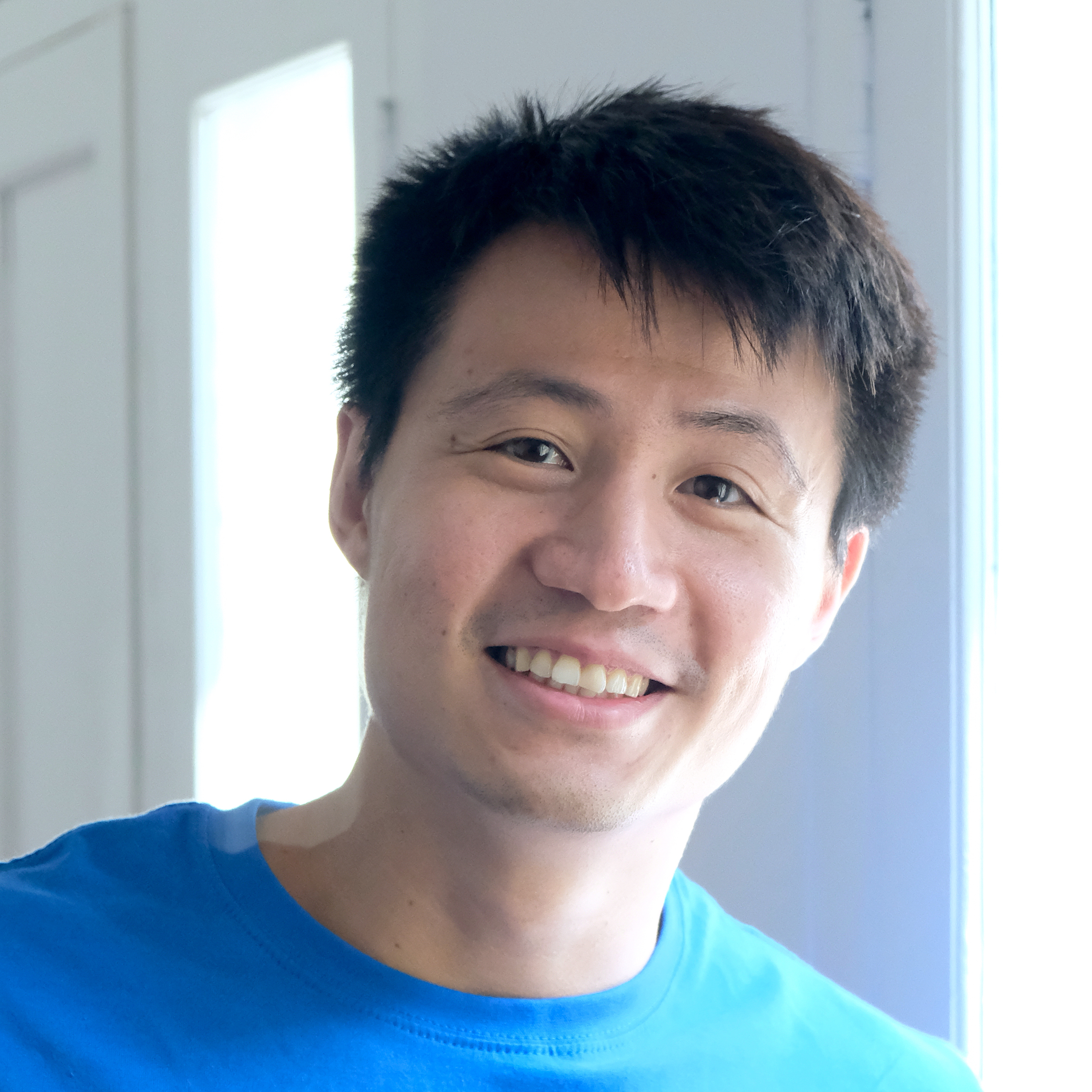
Co-founder & CEO at Saleswhale
Sign up for cutting edge ideas on conversational marketing, AI assistants and martech.
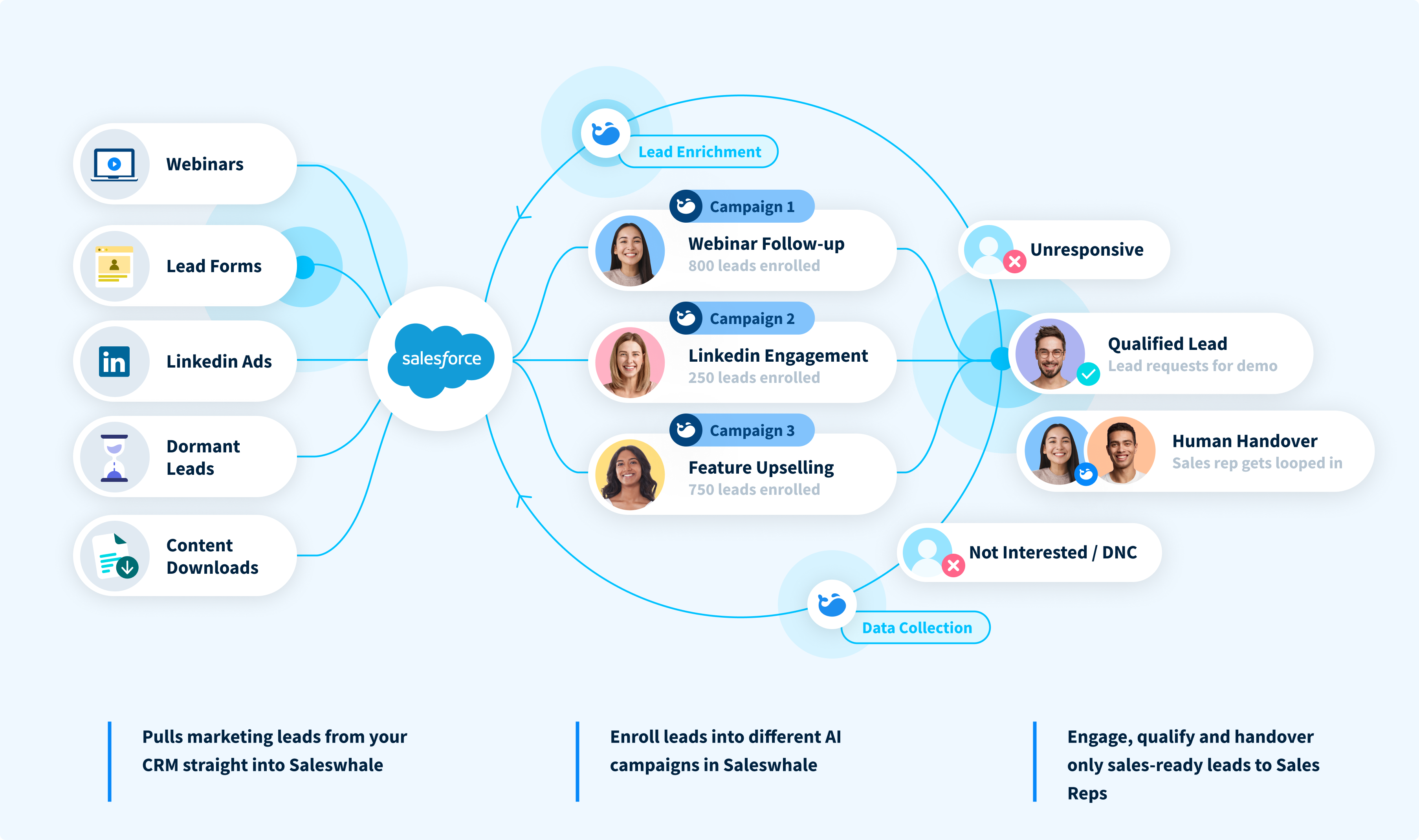
Saleswhale for Salesforce allows you to build powerful automated lead conversion workflows. This allows you to re-engage with your neglected marketing leads at...
19 APR 2021
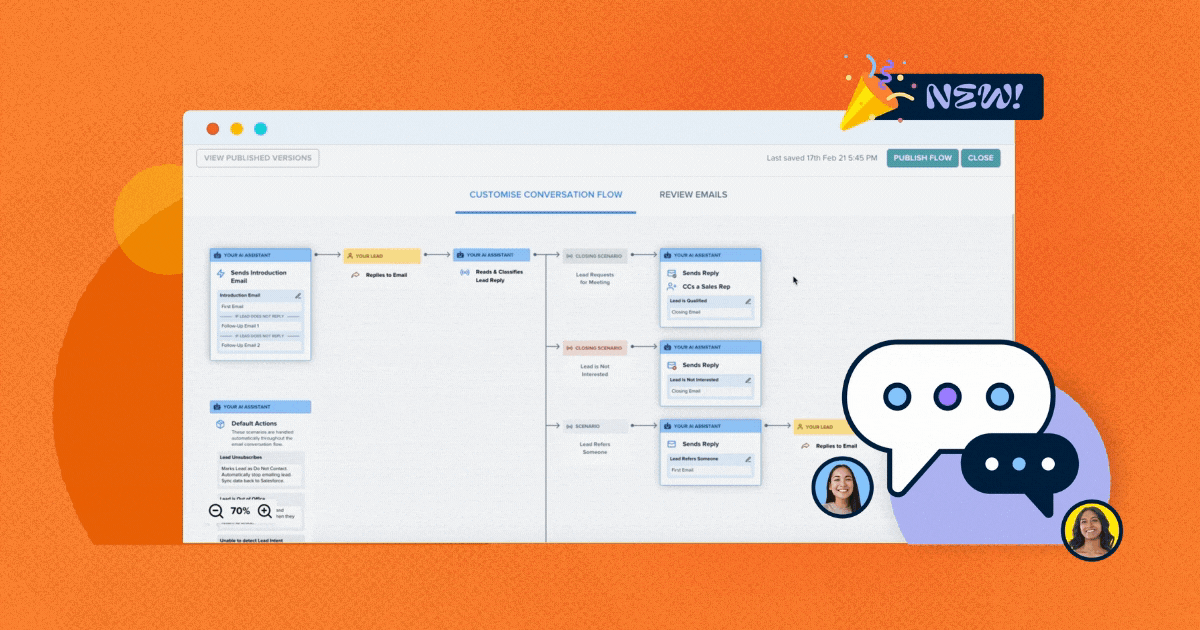
Demand generation and marketing teams generate more leads at the top of the funnel than ever in this new digital-first world. Saleswhale helps ensure those...
1 MAR 2021
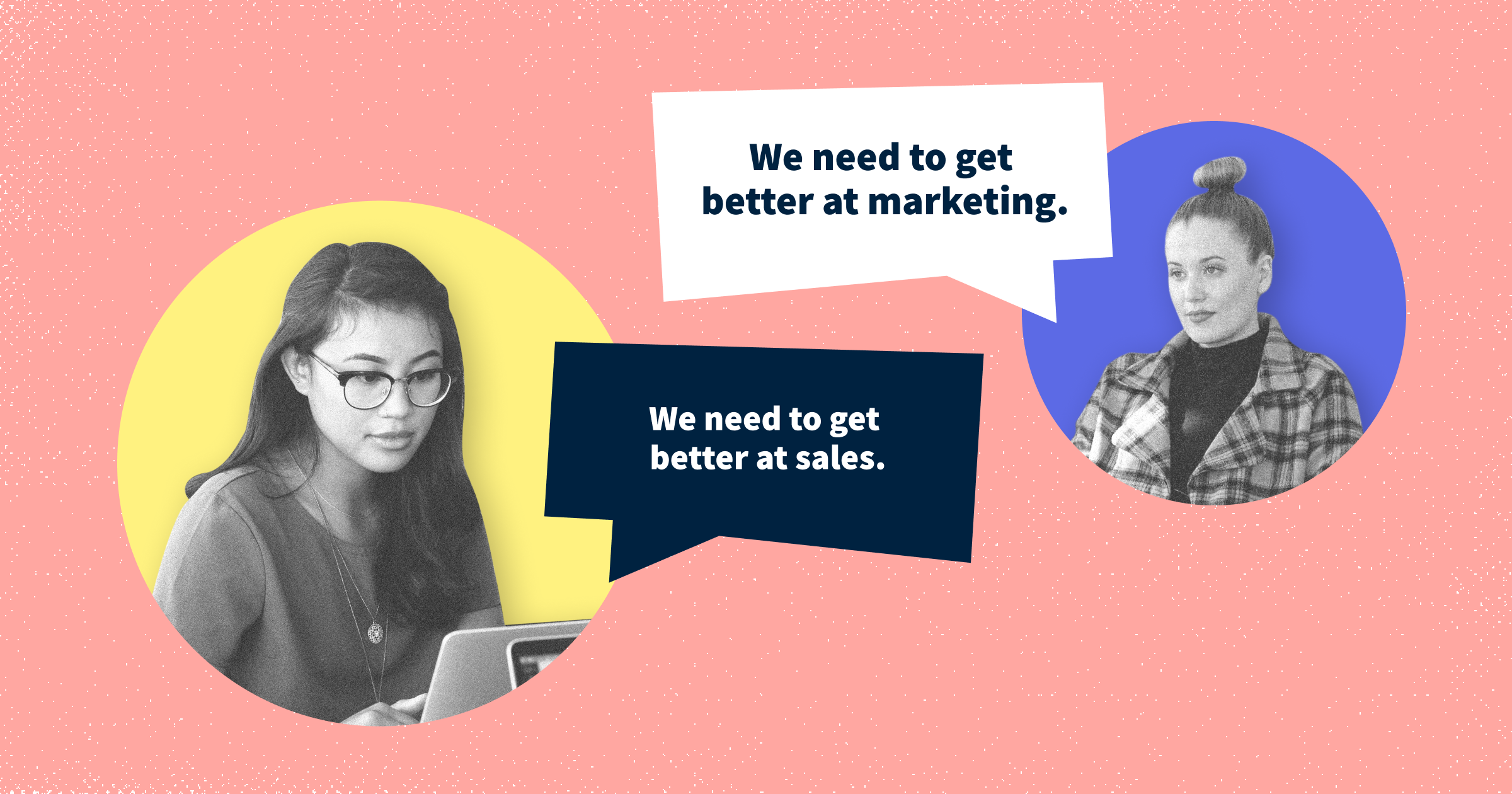
Marketers that focus on MQLs end up doing the wrong things in order to achieve the metrics. So I changed it.
16 JUN 2020
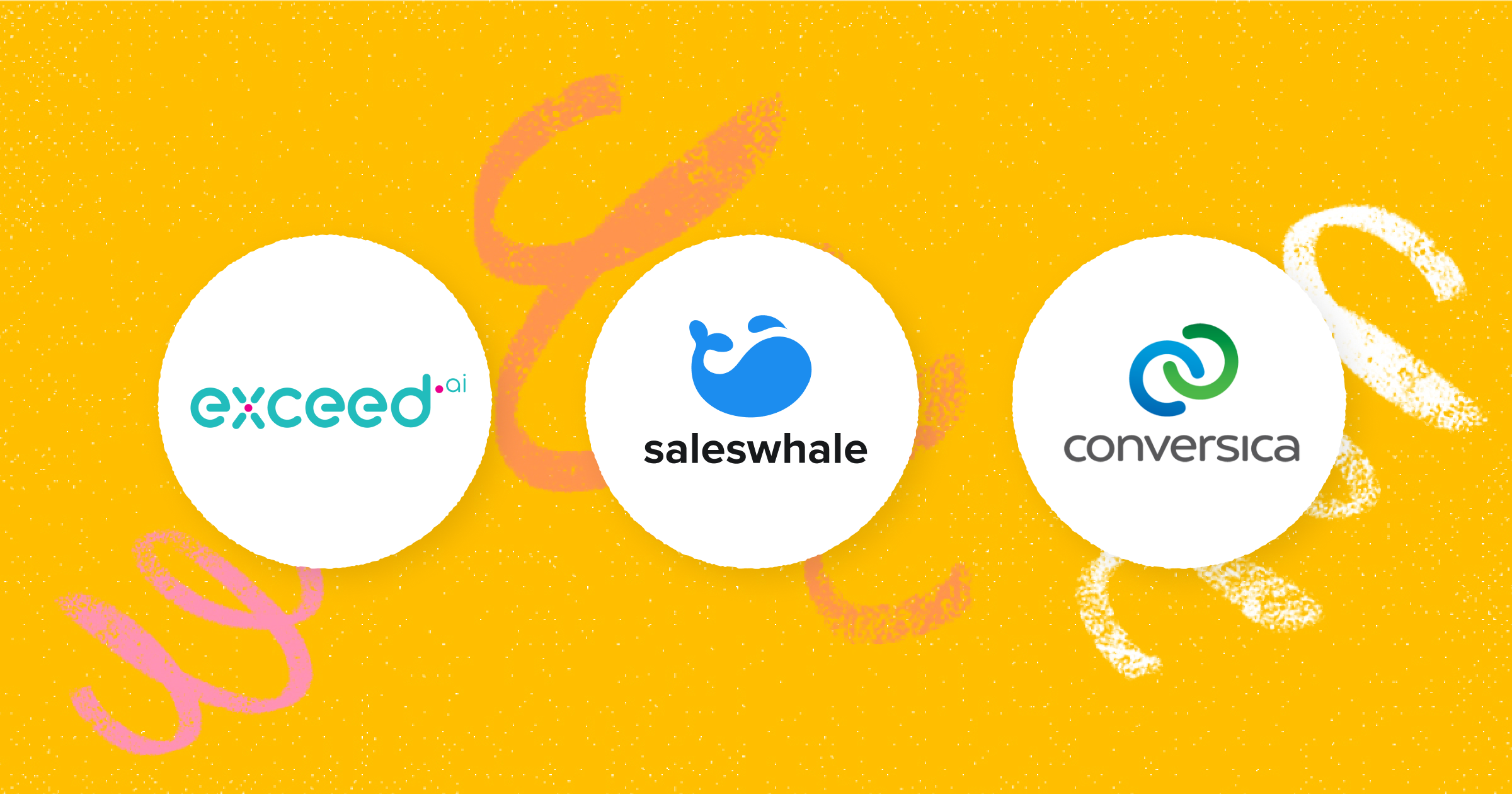
Conversica isn't the only player out there. Learn how Saleswhale and Exceed.ai compare and make an informed decision.
15 APR 2021
By providing your email you consent to allow Saleswhale to store and process the personal information submitted above to provide you the content requested.
You can unsubscribe at any time by clicking the link in the footer of our emails. For information about our privacy practices, please visit our privacy page.